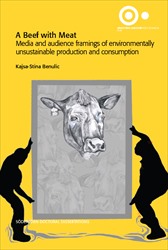The scientists: ‘Meat is bad for the environment’.
The Food and Agriculture Organization and the Swedish government authorities: ‘We must remedy this somehow’.
All together: ‘Consumers must be informed and educated about this. That way, they can choose what to eat more wisely, and put pressure on politicians and commercial actors’.
By making this suggestion together, the scientists and authorities followed the script for how environmental problems are commonly managed: through individualized consumer responsibility. But individuals can refuse to play the parts they have been assigned, or rewrite the script.
This thesis analyses media and audience framings to identify potential routes to making the Swedish meat production and consumption environmentally sustainable. Media is an important source of information on environmental and food-related issues, and audiences include the individual consumers whose participation is sought in solving environmental problems.
Kajsa-Stina Benulic carries out research in the field of environmental studies with a special focus on communication. This is her PhD thesis.


